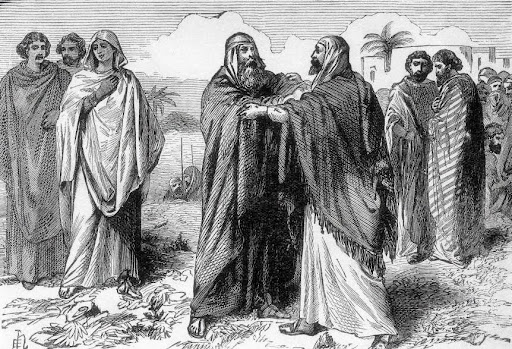I had a reasonably good relationship with my father-in-law, Clara's father, Vito Jerbi z"l. This, after a somewhat rocky start. The first time I met Clara's parents, Clara wasn't there; it was Friday evening and she was working as an intensive care nurse. I'd just arrived in Israel a few days earlier, and she'd arranged for her brothers to pick me up and take me to her parents' home on the moshav. Of course, the evening began with a rather intense interrogation by Clara's father and brothers! Afterwards, Vito told Clara that I was okay (just okay!), but my Hebrew was stilted. Several weeks later when we announced that we were getting married, he was not especially happy. No, it wasn't my Hebrew - rather that, since I was from abroad, he couldn't investigate my background to make sure I was from a good family.
But eventually I won Vito over, especially after Clara and I produced his 18th and 19th grandchildren. And over the years I grew to enjoy sitting with him, drink an arak or three, and listen to his stories about life in Libya during and after the Second World War. I learned quite a bit of history from him. After Vito passed away 11 years ago, I missed him.
One thing I never did with Vito was ask his advice, and he never offered it. It wasn't that I didn't think him worthy of consulting, it's just that anything on which I might have consulted him in those days, was far outside his experience.
Moses didn't have the same disconnect between him and his father-in-law. Yitro - Jethro - in whose camp Moses lived after he fled Egypt, was the leader of his tribe of Midianites. Moses has been sent back to Egypt by Hashem to free his Israelite people from servitude to Pharaoh, and having received the Divine appointment to lead the people in their exit from Egypt. So Jethro actually does have something to teach Moses - about leadership principles - and he freely offers his valuable advice when he visits with the Israelites in Sinai and observes his soon-in-law's leadership style.
That style is, to put it bluntly, controlling. Everybody has encountered a leader in the mold of Moses before his father-in-law's intervention. He's a micro-manager, making all the decisions himself, judging every dispute between two Israelites, perhaps fearful in his inexperience, or in his awe of his responsibility, to delegate authority. Jethro sets him straight, advising him to appoint leaders at various lower echelons, and to give them the authority to settle all but the weightiest matters. Moses himself would reserve those for himself. That way, in Jethro's words, Moses would avoid killing himself by being so overburdened by others' problems day and night.
Moses surely accepts and follows his father-in-law's advice, for in this week's portion we also see him ascending the mountain to receive the Law. Without having set up a system of echelons and delegations, he would not have been able to leave the people to have his encounter with Hashem on the mountain. Of course, in his absence there is a total failure of the leadership structure Moses has set up. But that's another issue entirely...

No comments:
Post a Comment